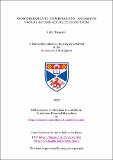Files in this item
From immersion to understanding : an essay on virtual art and aesthetic cognitivism
Item metadata
| dc.contributor.advisor | Gaut, Berys Nigel | |
| dc.contributor.advisor | Jones, Lisa | |
| dc.contributor.author | Troesken, Colin | |
| dc.coverage.spatial | 98 | en_US |
| dc.date.accessioned | 2023-02-06T11:23:31Z | |
| dc.date.available | 2023-02-06T11:23:31Z | |
| dc.date.issued | 2023-06-12 | |
| dc.identifier.uri | https://hdl.handle.net/10023/26910 | |
| dc.description.abstract | This dissertation argues against a cognitive devaluation of virtual art. By cognitive devaluation, I am referring to the charge that an art-kind is less artistically valuable than other art-kinds due to it lacking cognitive merits. I argue against this devaluation with three related arguments. The first argument says that virtual artworks can communicate perspectives which are conducive to understanding. I develop this argument by appealing to the standard features of virtual art, as well as to influential thoughts about the cognitive value of other art-kinds, especially literature. The second argument says that the cognitive value of a virtual artwork can sometimes count towards the artistic value of that artwork when appreciating that cognitive value requires appreciating the artistic success found within that artwork. The final argument shows that virtual art is not cognitively pernicious in any relevant sense, as is sometimes thought. If successful, these arguments jointly show that there is no good reason to devalue virtual art relative to other art-kinds on cognitivist grounds. | en_US |
| dc.language.iso | en | en_US |
| dc.subject | Aesthetics | en_US |
| dc.subject | Virtual media | en_US |
| dc.subject | Video games | en_US |
| dc.subject | Art and cognition | en_US |
| dc.title | From immersion to understanding : an essay on virtual art and aesthetic cognitivism | en_US |
| dc.type | Thesis | en_US |
| dc.type.qualificationlevel | Masters | en_US |
| dc.type.qualificationname | MPhil Master of Philosophy | en_US |
| dc.publisher.institution | The University of St Andrews | en_US |
| dc.identifier.doi | https://doi.org/10.17630/sta/265 |
This item appears in the following Collection(s)
Items in the St Andrews Research Repository are protected by copyright, with all rights reserved, unless otherwise indicated.

